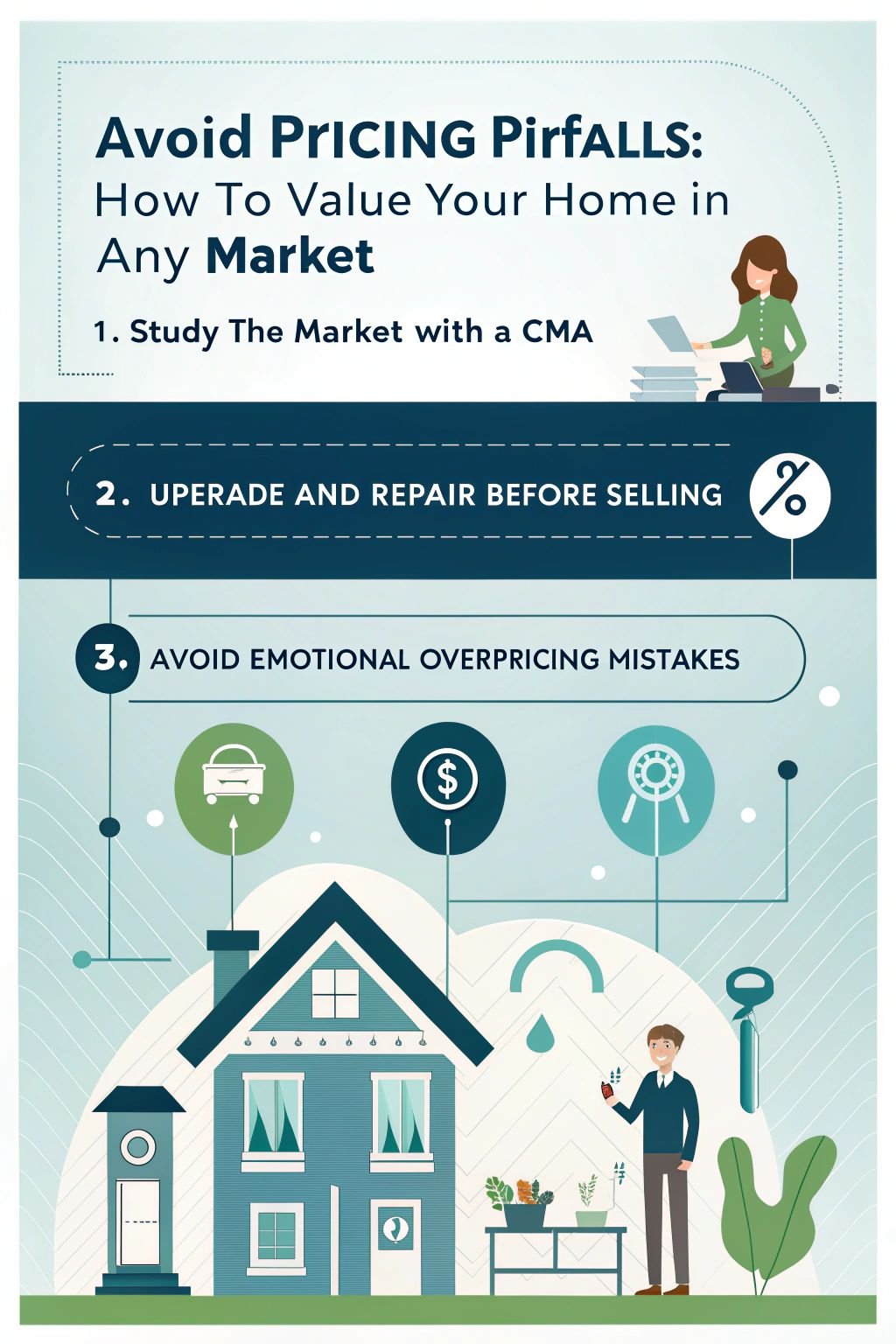Avoid Pricing Pitfalls: How To Value Your Home In Any Market!
Interested in selling your home at a favorable price? Determining the correct price is crucial in this process. This article will guide you on how to identify that ideal pricing point, regardless of the market conditions.
Continue reading for insightful suggestions!

How To Value Your Home In Any Market

Determining the optimal price for your home can feel like a strategic challenge. Success in any market condition rests on your ability to manage this challenge expertly. Start by becoming familiar with the current market dynamics – observe the real estate market diligently and assess the performance of houses similar to yours. This will provide insight into the buyer’s reception to prevailing prices.
Subsequently, get ready to conduct some investigative research through a Comparative Market Analysis (CMA). This involves assessing homes similar to yours that have been sold recently – akin to matching socks, you’re seeking duos that are closely similar.
Beyond external comparisons, it’s integral to evaluate your own house. How does your home compare to others? For instance, if your kitchen exudes a contemporary feel, while the one down the street retains an outdated vibe, you hold an advantage.
Additionally, consider the timing of your sale. Similar to how ice cream experiences increased sales in the summer, houses also experience seasonality effects, with certain periods being more appealing to buyers.
Use caution during this procedure!
Understand Market Trends
Understanding the housing market can be beneficial before you set a price for your home. Consider the following: from April to June, homes are sold at a fast pace with over 16,530 homes getting sold daily.
Price increase around 16% compared to the slower months from December to February, where only about 11,380 homes are sold daily. These numbers demonstrate how timing can significantly affect your profit.
Also, factors such as employment rates, income levels, housing supply, and loan rates significantly influence home pricing. Being aware of these trends can assist you in determining your home’s fair market value without having to guess.
It’s like having valuable information that gives you an advantage.
Finally, conducting a Comparative Market Analysis (CMA) is a crucial next step. This process offers you even more insights into correctly pricing your home.
Conduct a Comparative Market Analysis (CMA)
After becoming familiar with market trends, your following step involves analyzing a Comparative Market Analysis (CMA). This method contrasts your property with others in your vicinity that were recently sold.
It’s recommended to examine between five to ten properties like yours that were sold in the previous three to six months. A solid CMA helps you establish a price that quickly appeals to potential buyers.
Utilizing tools such as iCMALive and Cloud CMA can simplify this process for real estate agents. These resources enable them to quickly access precise data. They play a significant role in ensuring your home’s price aligns with what potential buyers anticipate in our current market.
Roughly 25% of sellers need to engage a new agent because their homes initially fail to sell. A comprehensive CMA mitigates this risk by establishing realistic prices from the beginning.
An accurate CMA isn’t just about figures; it’s an art that fuses current market trends with your home’s unique attributes.
Factor in Your Home’s Condition and Features
The condition of your home significantly influences its worth. Consider factors like its size, age, and the level of maintenance you’ve provided. Larger homes occupying more land often have a higher price tag.
However, any repair needs might cause a decrease in your property’s value. Performing updates can improve aesthetic appeal and attract more potential buyers.
The characteristics of your home are also crucial. What’s your count of bedrooms and bathrooms? Such features directly affect the valuation of your home. A thorough assessment of your house assists in estimating its accurate selling price, showcasing the real worth of your property to prospective buyers.
Assess Seasonal Market Fluctuations
Seasons transition and so does the housing market. In summer, action diminishes with sales decreasing to 16,200 houses a day. It declines further from October to November, averaging 13,810 daily transactions.
This period favors buyers; they gain more negotiation power from December to February. Warmer regions experience less winter deceleration.
Your location influences your home’s worth during varying seasons as well. Being aware of these trends assists you in determining the optimal time to sell or buy a property. Utilize resources like Zillow or consult a local real estate agent to smoothly handle these fluctuations.
They can provide a value estimate for your home under current conditions and aid in determining the potential price your place could command in the free market at any time of the year.
Common Pricing Pitfalls to Avoid
When pricing your home, steering clear of a few common errors can significantly impact the outcome. Setting a price excessively high due to sentimental value might appear reasonable, but it tends to deter potential buyers.
Ignoring repairs of broken or outdated features before selling can depreciate the value of your house. If you have invested in substantial improvements in the past, this doesn’t necessarily dictate your current sale price. Similarly, neglecting to research the prices of comparable homes could result in lack of interest in your property.
To bypass these missteps and learn more effective ways to optimize your process, continue reading!
Overpricing Due to Emotional Attachment
Navigating the process of selling your house can become tangled when emotions get involved. You’ve spent years building precious memories there, which can often lead to the belief that it’s worth more than the market suggests.
However, potential buyers don’t share those same memories. They base their decisions on recent home sales, the number of bedrooms and bathrooms the house has, and the estimated cost of necessary renovations.
Setting a price tag that’s too high due to emotional attachment can result in unintended consequences. Typically, it leads to your property lingering on the market. Prospective buyers may begin to wonder why the property hasn’t been purchased yet.
This situation isn’t beneficial for you or your property.
The trick lies in uncovering the balance between emotional attachment and the actual market value of the house. A Comparative Market Analysis (CMA) can be a valuable tool in this endeavor.
Real estate professionals can provide a realistic snapshot of the current selling prices for houses similar to yours. By trusting their expertise, you can set a reasonable and appealing price that attracts buyers instead of deterring them.
Ignoring Necessary Repairs or Updates
Addressing issues in your home before listing it can enhance its market value. Consider this scenario: identifying and resolving problems early on might result in a higher selling price.
Only a pre-sale inspection can help you detect these concerns. Rectifying aspects such as dripping faucets or faulty windows prior to selling can prevent the need to reduce your asking price later.
At times, homes require enhancements to pique buyers’ interest. If your property appears outdated, it may attract fewer potential buyers. Implementing minor modifications, like wall painting or light fixture upgrades, can bring a significant impact.
These initiatives keep your property competitive in the current market and attract a larger pool of buyers willing to meet your asking price.
Basing Price Solely on Past Home Improvements
Setting your home’s price simply based on past improvements may not always be accurate. You might have invested substantially in renovations, yet it doesn’t guarantee a higher selling price for your house.
Potential buyers evaluate the value that these enhancements bring to the house, disregarding the amount you invested. As an instance, installing an upscale kitchen might not necessarily escalate your sales price, especially if surrounding houses lack this feature.
Furthermore, certain updates do not noticeably augment your home’s value. It’s essential to discern which improvements genuinely resonate with buyers in your locality. Consulting with a local real estate specialist or using an online home valuation tool can provide insights into what’s effective and what isn’t.
This approach prevents you from overpricing your house resulting from expensive modifications that fail to lure more capital from buyers.
Neglecting Market Competition
While you may presume that renovations alone determine your home’s worth, neglecting to consider the prices of other properties on sale could lead to unintended outcomes. The value of properties on sale in your vicinity affects the amount buyers are willing to offer for your home.
Without monitoring these, your asking price could end up being too high or too low.
Browsing the current market can assist you in making accurate pricing decisions. Consistently observing the status of neighboring properties on sale can prevent undesired surprises.
For instance, if several similar homes are on sale and remaining unsold for an extended period, it could indicate a potential issue. It might be necessary for you to reconsider your price to attract attention.
While the importance of renovations and repairs cannot be overstated, understanding your competitors is equally significant. By doing so, your property won’t be overlooked due to inappropriate pricing.
Tips for Finding the Right Price
Seeking the appropriate pricing for your house might appear challenging. Receiving beneficial guidance and utilizing the correct tools is vital. Consult with an estate professional familiar with house sales in your locality. They possess extensive experience and can provide recommendations on determining an intelligent cost.
Moreover, utilize online sources that provide information on property values. These platforms evaluate your house in comparison with others in the vicinity to establish a viable pricing spectrum. Furthermore, demonstrating flexibility in your price strategy as required indicates to potential buyers your earnest intent to sell.
Consult a Real Estate Professional
When communicating with a real estate professional, they have comprehensive knowledge of the market and can estimate an accurate price for your property. The Temple Team provides individual discussions to ensure your property is priced reasonably.
This ensures you do not undervalue or overvalue your property.
These professionals observe properties similar to yours that have sold in the past. They use this data to create a potential selling point for your property. Furthermore, they possess negotiation skills and knowledge of up-to-date trends that could influence the price of your property.
Leverage Online Home Valuation Tools
Online resources can assist you in discovering the worth of your home. They employ information from historical sales and market patterns. Hence, you acquire a realistic perspective of your property’s current value.
It is recommended that you utilize several resources to encounter varied appraisals of your home’s worth.
Leveraging internet valuation resources provides an instant indication of your property’s market standing.
These resources stay updated with market trends, so make sure to refresh your details regularly. This lets you identify if the worth increases or decreases over time. It’s simple and swift to verify at all times.
Stay Flexible and Open to Adjusting the Price
Selling your home can involve patience and strategy. Your first price may not always be on target.
- Monitor market trends closely. If homes similar to yours begin to sell for less, it’s time to revise your price.
- Pay attention to feedback from home showings. Prospective buyers can point out factors you might have missed, which could influence your home’s value.
- Implement a clear plan for a price reduction if you don’t receive offers after multiple showings. This strategy helps you swiftly adjust to the market.
- Refresh your listing to revive interest in your property. At times, minor tweaks in your home’s online presentation can draw in more buyers.
- Use home value estimators as a preliminary guide, but don’t solely depend on them. These resources provide a general estimate but may miss the unique features of your house.
- Regularly confer with real estate experts. They keep track of local market situations and can suggest when a price adjustment is reasonable.
- Be open to negotiation. Buyers appreciate the feeling of a good deal, and a willingness to discuss the price can expedite a sale.
- Be aware that the time of year can influence prices. Homes usually sell for more during the spring and summer months. Be prepared to adapt if you sell at a different time.
Being adaptable with pricing doesn’t simply imply reducing it; occasionally, demand could indicate that your home is more valuable than initially estimated!
Conclusion
Introducing Alex Johnson, a seasoned professional in the world of real estate, who comes with years of experience in appropriately evaluating homes like yours. Alex, armed with an expertise in market research and a natural ability for understanding numbers, has guided numerous sellers to find the optimal price for their homes.
Alex emphasizes that correctly pricing your home carries more weight than most factors in a successful sale. The secret lies in understanding local market trends, juxtaposing your home to similar ones, and knowing buyer preferences for different seasons of the year.
Be aware, simple errors can lead to major issues. Overpricing due to personal attachment to your house or ignoring necessary repairs can deter potential buyers.
Here’s a tip from Alex: Collaborate with a seasoned professional. Utilize online instruments for an initial estimate but don’t make them your sole basis. Be prepared to adjust your price if required.
Now, to provide a broader perspective: Determining the optimal price streamlines the selling process and might even earn you a higher sum. However, it demands effort and occasionally involves making hard decisions about enhancements or reducing the asking price.
Ultimately, Alex highlights that understanding how to price your home is vital within any market scenario. It aids in achieving quicker sales and fetching a fair price. Hence, invest your time wisely, make the most of available resources, and refrain from hastening this significant decision.
FAQs
1. How can I determine the value of my home in any market?
You can determine the value of your home using a variety of methods, such as online home value estimators, professional appraisals, and understanding local real estate market conditions. Knowing your home’s worth helps you set an asking price that reflects its true value.
2. What is the difference between assessed value and market value?
Assessed value refers to a valuation set by local authorities for tax purposes while the estimated market value is what buyers might be willing to pay for your house on an open market. It’s crucial to understand both when setting your selling price.
3. Why is it important to avoid listing my home too high?
Listing your house at a higher than its fair market price could lead to it sitting on the market longer than necessary. Buyers may perceive overpriced homes as less attractive options compared with other houses on the same local marketplace.
4. Can features of my home affect its overall worth?
Absolutely! Features like updated kitchens or bathrooms, energy-efficient installations, or even proximity to amenities can increase your property’s appeal and hence boost its selling price in any buyer’s or seller’s markets.
5. How does knowing my home’s equity help me sell it better?
Knowing how much equity you have – which means how much of your mortgage you’ve paid off – gives you an idea about how much profit you stand to make when selling a house; this knowledge aids in making informed decisions about pricing strategy for maximum returns.
6. Is there any way I can increase my house’s estimated worth before putting it up for sale?
Indeed! Undertaking strategic improvements like renovations or upgrades not only enhances living standards but also potentially boosts appraisal results – meaning more bang for every buck potential buyers are willing to shell out.
References
- https://www.researchgate.net/publication/280466869_Integrating_Real_Estate_Market_Conditions_into_Home_Price_Forecasting_Systems (2024-10-22)
- https://www.theceshop.com/agent-essentials/real-estate-agent-encyclopedia/comparative-market-analysis
- https://www.andrewfinneyteam.com/blog/top-mistakes-to-avoid-with-comparative-market-analysis-when-buying-a-home/
- https://www.experian.com/blogs/ask-experian/factors-that-affect-home-value/ (2022-03-10)
- https://www.nar.realtor/blogs/economists-outlook/navigating-the-housing-market-a-seasonal-perspective (2024-04-29)
- https://www.investopedia.com/articles/investing/010717/seasons-impact-real-estate-more-you-think.asp
- https://talktoannie.com/mistakes-to-avoid-when-pricing-your-home-for-sale/
- https://smithspencer.com/house-pricing-mistakes-to-avoid-common-pitfalls-and-how-to-prevent-them/
- https://www.1percentlistsarkansas.com/sell-my-home-cheap/pricing-pitfalls-when-selling/
- https://www.theownteam.com/blog/house-pricing-mistakes-to-avoid-common-pitfalls-and-how-to-prevent-them/ (2024-07-25)
- https://www.ohiorealestatesource.com/blog/how-to-price-your-home-for-sale/ (2024-08-19)
- https://www.investopedia.com/articles/mortgages-real-estate/08/fair-price-on-home.asp
- https://pugetsoundislandhome.com/blog/how-to-set-the-right-price-for-your-home-in-todays-market
- https://richr.com/blog/setting-the-right-price-how-to-avoid-overpricing-your-home-for-a-quick-sale/
- https://www.theownteam.com/blog/setting-the-right-price-for-your-home-sale-key-strategies-for-success/



















